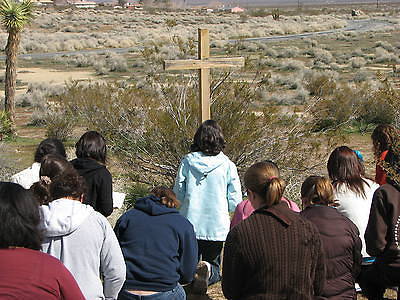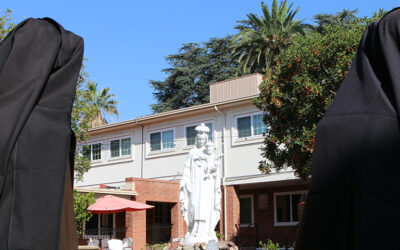Our hearts long for God, we are made for the infinite joy of heaven, and sometimes we seek to satisfy this longing in relationships, in material possessions, in pleasure. Yet, if we are truly honest with ourselves, there is always a moment where people disappoint us, a long awaited material possession once gained eventually becomes boring, even pleasure can become insipid. These moments are moments of profound grace because we are experiencing the reality that only God can truly and completely satisfy our heart in a lasting way. When we center our hearts and lives on God, we can find a true joy in people, and things, and pleasure that does not disappoint because we are not seeking our fulfillment in them. As C.S. Lewis noted, when we put second things first, we lose both second and first things. But when we put first things first, we find that the second things are also ours.
The practice of daily prayer keeps us rooted in the reality of God’s love for us. It keeps our hearts and lives centered in Him. Mortification, penance, are also key to a constant living in His presence as mortification is the “prayer of the senses” (Saint Josemaria Escriva). May this brief excerpt from the writings of Saint Josemaria Escriva encourage you on your journey to a deeper relationship with Christ…
From Christ is Passing By, by Saint Josemaria Escriva…
In order to reach sanctity, an ordinary Christian — who is not a religious — has no reason to abandon the world, since that is precisely where he is to find Christ. He needs no external signs, such as a habit or insignias. All the signs of his dedication are internal: a constant presence of God and a spirit of mortification. As a matter of fact, only one thing is necessary, because mortification is nothing more than prayer of the senses.
The christian vocation is one of sacrifice, penance, expiation. We must make reparation for our sins — for the many times we turned our face aside so as to avoid the gaze of God — and all the sins of mankind. We must try to imitate Christ, “always carrying about in our body the dying of Christ,” his abnegation, his suffering on the cross, “so that the life also of Jesus may be made manifest in our bodies.” Our way is one of immolation and, in this denial, we find gaudium cum pace, both joy and peace.
We do not look upon the world with a frown. Some biographers of saints have in the past been interested only in highlighting extraordinary things in the lives of God’s servants, from even their earliest days in the cradle. They have, unintentionally perhaps, done a disservice to christian truth. They even said of some of them that as babies they did not cry, nor drink their mother’s milk on Fridays, out of a spirit of penance. You and I came into this world crying our heads off, and we most assuredly drank our milk in total disregard for fasts and ember days.
Now, we have learned to discover, with the help of God, in the succession of apparently similar days, a time for true penance, and in these moments we resolve to improve our life. This is the way to ready ourselves for the grace and inspirations of the Holy Spirit in our soul. And with that grace, I repeat, comes gaudium cum pace: joy, peace and perseverance in our struggle.
Mortification is the seasoning of our life. And the best mortification is that which overcomes the lust of the flesh, the lust of the eyes, and the pride of life in little things throughout the day. Ours should be mortifications that do not mortify others, and which give us more finesse, more understanding and more openness in our dealings with everybody. You are not mortified, if you are touchy; if your every thought is for yourself; if you humiliate others; if you don’t know how to give up what is unnecessary and, at times, what is necessary; if you become gloomy because things don’t turn out the way you had hoped. On the other hand, you can be sure you are mortified, if you know how to make yourself “all things to all men, in order to save all.”




